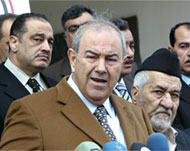Differences stall Iraq government
Iraqi rebels have staged bomb attacks and battled US forces in one of the deadliest waves of violence since the 2003 invasion, as new divisions arose over forming a unity government.

Bickering politicians said on Tuesday that talks on forming a government that had dragged on for four months could take another month.
At least six people were killed in attacks, including four in a roadside bomb near a restaurant in north Baghdad.
An Iraqi army soldier was killed by gunmen on the main road west of the northern city of Kirkuk, police said.
And a tribal shaikh was killed in an explosion after rebels planted a bomb in his car south of Baghdad.
In the Dura district of southern Baghdad, police discovered two bodies, both shot in the head.
Iraqi troops had begun a massive search operation in the capital’s Sunni district of al-Adhamiya after fierce exchanges with fighters on Monday.
US troops also had repelled an attack in the western city of Ramadi on Monday, where several car bombs were driven at the heavily fortified government building that houses a marine base as well as the offices of the provincial governor.
Nearly 50 US soldiers have been killed across Iraq since April 1, making it one of the bloodiest periods for the military since the invasion.
Divisions
US leaders have hinted that the power vacuum is fuelling the violence.
This month, the US secretary of state, Condoleezza Rice, made an unannounced visit to Baghdad with Jack Straw, the British foreign minister, to demand a greater sense of urgency from Iraqi politicians.
New divisions emerged on Tuesday over the distribution of posts in a national unity government – this time between previously allied Sunnis and secularists.
As a result, politicians said it was likely to be another month before a consensus was reached.
Zhafer al-Ani, spokesman for the main Sunni Arab bloc, the National Concord Front, said: “There are still many differences within the groups, and I think we need at least a month to form the government.”
 |
|
Allawi’s (R) attempt for a vice |
Al-Ani said the former Sunni Arab elite, which dominated Saddam Hussein’s government and previous Iraq regimes, would not stand in the way of the formation of a broad coalition embracing all of Iraq‘s ethnic and religious groups.
But he rejected calls by the secularist faction of Iyad Allawi, a former prime minister in the post-Saddam era and a pro-Western Shia, to be given one of the two posts of vice president, a position currently held by a Sunni.
“There is another problem. Allawi wants the post of vice president, which is ours,” he said.
Rassim al-Awadi, a senior official of Allawi’s faction which has 25 members in the 275-seat parliament against 44 for the National Concord Front, confirmed that the former prime minister was seeking a position on the three-seat presidency.
“Allawi is our candidate for the vice president and we will also announce a candidate for the deputy prime minister’s post once the prime minister is fixed by the Shiite alliance,” al-Awadi told AFP.
Shias vs Sunnis
He acknowledged that the Sunnis had reservations about the candidacy of Allawi because “they say the two vice-presidencies are meant for Shia and Sunni candidates”.
“We do not agree with such sectarian sharing,” said al-Awadi. “Nothing in the constitution says that the posts should be shared like this. We are Iraq, not Lebanon,” where top political offices were distributed along sectarian lines.
The Sunnis are also facing stiff opposition from the Shia alliance to their candidacy for the post of parliament speaker.
Tareq al-Hashemi, leader of the Iraqi Islamic Party which is a key member of the National Concorde Front, has been nominated for the post, but the Shia United Iraqi Alliance has opposed it.
“The Shia opposition is a reaction to our opposition to Jaafari,” al-Ani said.
Sunni Arabs and Kurds have opposed the Shia alliance’s nomination of the incumbent prime minister, Ibrahim al-Jaafari, to lead a new government, saying he has failed to curb sectarian violence.
Talks on forming the new government started soon after the December 15 election of the first full-term parliament since the US-led invasion.